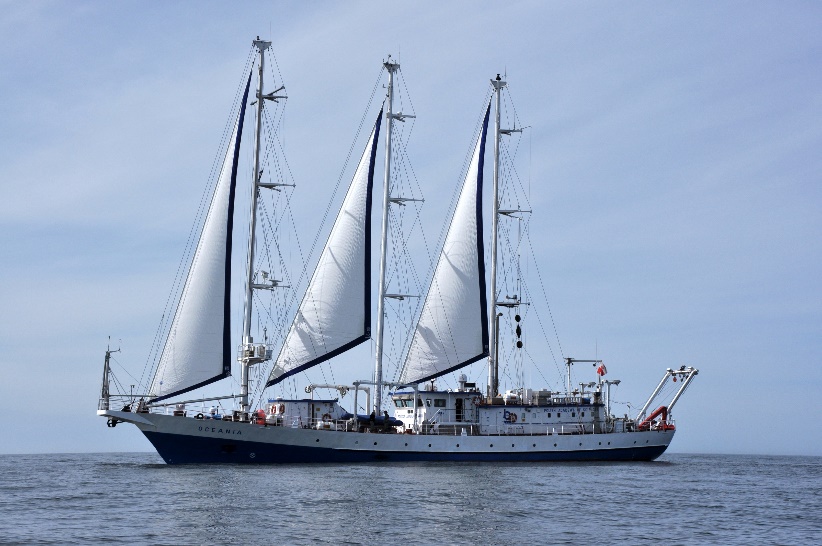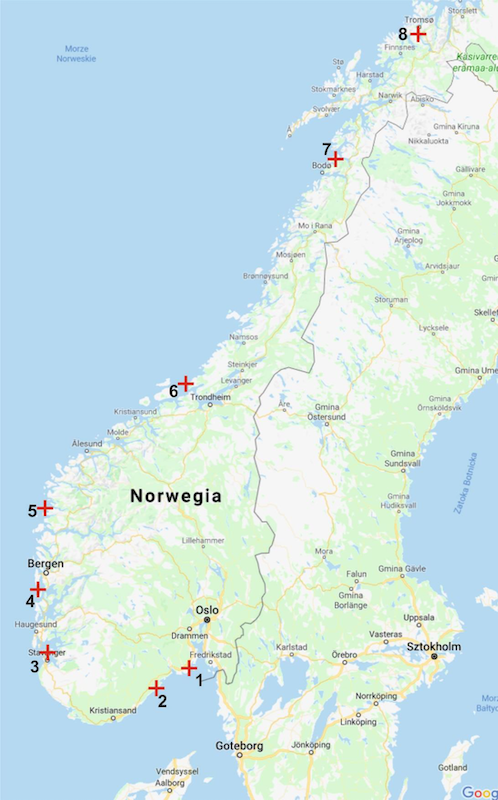“Use bio-optical parameters as convenient tool to study marine biogeochemical processes ”
Onboard the R/V Oceania
during the passage from Gdansk, Poland to Tromso, Norway 4-16 June 2020..
The EurofleetsPlus “Floating University”
Costly Trans National Access (TNA) of Global/Ocean class Research Vessels (RVs) cannot be assigned on the basis of need, but have to be obtained only on the base of scientific excellence. This presupposes adequate planning and implementation of high-return first-class scientific research. However, less equipped countries cannot compete for TA with the countries that own, manage and access Global/Ocean class Research Vessels to perform first-class scientific research.
Eurofleets+ will utilise the unique facilities offered by the fleet and equipment and the experience and knowledge of the consortium to deliver five ‘Floating Universities’, a series of ship-based training initiatives in marine related sciences areas such as scientific instrumentation, the collection and processing of samples, data analysis, quality control, and processing.
General course objectives
 |
 |
The general objective of the course is to provide theoretical background and practical experience in conducting instrumental measurements of inherent and apparent optical properties in marine waters and collecting water samples for determination of concentrations of optically significant sea water constituent. Student will be familiarized with latest IOCCG measurements and sampling protocols and state of the art optical instrumentation. Training will be conducted during the passage cruise from Gdansk, Poland to Trømso Norway, on board of R/V Oceania which is operated by Institute of Oceanology Polish Academy of Science, Sopot, Poland. The traditional measurement and sampling will be done on selected sites in Norwegian Fjords (see Figure) and as underway measurement along ship track on the Baltic Sea Danish Strait and Norwegian Sea.
Learning objectives
The course is addressed to post-graduates student conducting education and research for development of Master of Science and Ph.D. degree
Students participating in this course will learn to:
- measure inherent optical properties of sea water using set of state of the art instruments integrated into optical- hydrological probe
- process acquired instrumental data performing spectral and noise corrections.
- maintain routines of optical instruments.
- collect water samples for laboratory measurements, to determine the concentrations of optically significant sea water constituents
- laboratory routines for spectroscopic measurements of concentrations of optically significant sea water constituents
- conduct measurement of apparent optic properties using profiling radiometer and floating radiometer
- Process acquired instrumental data to derive spectral remote sensing reflectance and downwelling irradiance diffuse attenuation coefficient
- collect sediment core using standard Niemisto corer
Course content
The course is composed of a combination of lectures, laboratory work and practical sampling/measurements, and interpretation of optical and bio-geochemical data. Before the cruise, trainees will attend two introductory days (June 4 and June 5, 2020) at Institute of Oceanology Polish Academy of Sciences in Sopot (Poland), with lectures covering the theoretical background in ocean optics and geochemistry, and practical training in laboratory measurements. A description of planned experimental work, survey design & planning, and practical issues will be carried before boarding the research vessel. We will be muster on board RV Oceania on June 6, 2020 in the morning, and leave the Gdansk harbour the same day around noon. On board students will work in two teams/groups conducting measurements and water and sediments sampling on selected station in Norwegian fjords and along the ship track during passage from Gdansk to Norway. Data acquisition and processing workshops will be conducted in the evenings together with lectures presenting the scientific aspects of the study area. Analysis and interpretation of the instrumental measurements data collected during the cruise will begin on board and continue until the last day on-board. The course will end in Trømso (Norway), with a presentation/open discussion on the data collected, and the compilation of the cruise report by students on the last day on-board. Students are expected to return to their home institutions immediately after disembarkation in Trømso on June 16, 2020.
Time Plan
- The course will be from the June 4 to June 16 2020.
- Participants are expected to arrive to the Institute of Oceanology Polish Academy of Sciences, Sopot Poland on June 4 before noon.
- 1st day: June 4, 2020, in the afternoon at the Institute of Oceanology Polish Academy of Sciences, Sopot Poland the introductory lectures in ocean optics, sampling protocols and safety briefing will be given.
- 2nd day: June 5, 2020, at the Institute of Oceanology Polish Academy of Sciences, Sopot Poland in the morning sampling and instrumental measurements in the Gulf of Gdansk on board of the small research vessel r/v Sonda II, in the afternoon processing water samples and spectroscopic measurements in laboratory (on land)
- From June 6, 2020 to June 14, 2020 on-board activities on r/v Oceania
- June 15, on board post-cruise onshore activities, data interpretation, writing cruise report.
- June 16, 2020 in the morning, arrival to Trømso
- June 16, 2020 in the afternoon, departure to home institutions
Teachers
- Assoc. prof. Piotr Kowalczuk, course leader, chief scientists on board R/V Oceania, training and lectures on ocean optics and inherent optical properties
- Marta Konik – apparent optical properties and in water radiometry
- Joanna/Stoń-Egiert – water sampling, processing, lab measurements
- Dr. Małgorzata-Szymczak Żyła / Dr Ludwik Lubecki – lectures on geochemistry, instruction on collection and processing of sediment cores
- Dr Ludwik Lubecki – lectures on persistent organic compounds pollution
Application
A total of 8 positions are available for European post-graduate students (students of all nationalities enrolled at European universities) and the selection will be based on the information provided in the application form.
Online application form available to access at
https://www.eurofleets.eu/applications/
Applications must be received by March 15, 2020
Successful applicants will be notified by April 24, 2020
At the end of the course a certificate of completion will be delivered to all participants. This will include module descriptor of the course.
Costs and travel grants
The course is funded by EU H2020 project Eurofleets+
The course is free of charge, but participants need to pay for their own travel expenses to Sopot (Poland) and return from Trømso (Norway) to their home destination. The accommodation in Sopot on June 4 and June 5 will be provided by course organizers. Lunches during the course activities on June 4 and June 5, and dinner on June 5 will be provided by organizers. The access to laboratories and to the small research vessel r/v Sonda II on June 5 will be provided by Floating University organizer’s
Contacts
- https://www.eurofleets.eu/
- Course organizer Institution: Institute of Oceanology, Polish Academy of Sciences, Sopot, Poland, http://www.iopan.gda.pl/
- on board of R/V Oceania http://www.iopan.gda.pl/oceania.html
For any additional questions, please contact the Course Coordinator:
Piotr Kowalczuk
Assistant Professor
Institute of Oceanology PAS,
ul Powstancow Warszawy 55
81-712, Sopot, Poland
phone: ++48 58 7311 817
e-mail: piotr@iopan.gda.pl
